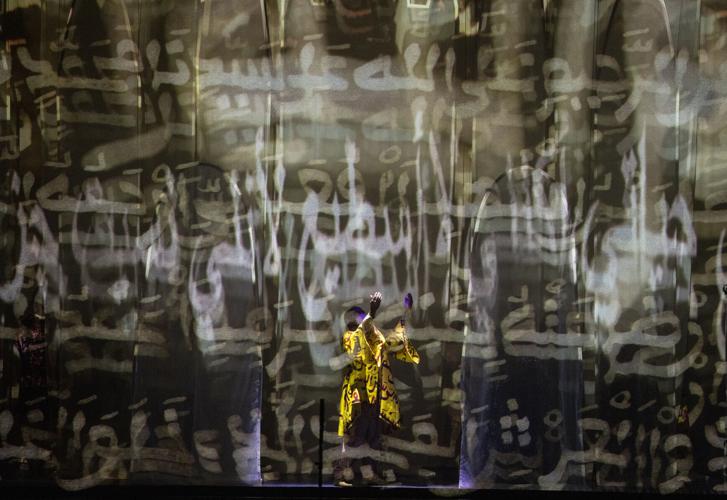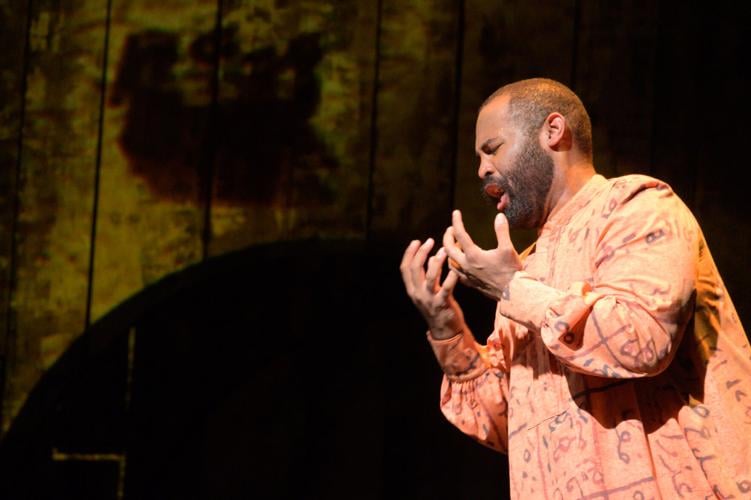The main question prompted by seeing "Omar," the new opera by composers Rhiannon Giddens and Michael Abels that had its world premiere on May 27 as part of Spoleto Festival USA, may well be this:
What took so long?
If the question pertains specifically to the timing of this production, that's fairly easy to explain.
The project began five years ago by former Spoleto Festival USA General Director Nigel Redden and team, then was postponed twice by the pandemic. When Redden retired, it fell into the hands of his successor, Mena Mark Hanna, who has championed the work and made it the galvanizing force of his first season.
Those sudden stops and false starts have also resulted in a build-up that's operatic in its own right. Its debut in Charleston has drawn national attention, and its opening night was chock-full of high-profile audience members, among them Congressman Jim Clyburn and other members of the Congressional Black Caucus.

Jamez McCorkle as Omar in Spoleto Festival USA 2022's world premiere of "Omar." Leigh Webber/Provided
And that leads to the more pressing question on timing: Why has the first-person account of an enslaved African's journey from the place of origin through to his life in captivity — inarguably the embodiment of the most consequential, repercussive and tragically human event of the collective American experience — taken so long to find its way to an opera stage?
The answer to that bears far more column inches and input on the telling of essential American stories than can be contained in this review.
But Omar's story has finally arrived to the stage, driven by a Black composer — and right here in Charleston, dead center in the Gordian knot of America's tangled, tainted past. The production, directed by Kaneza Schaal, is keen to honor the work's resonant, real-life source material: the autobiography of Omar ibn Said.
A Muslim scholar from the Futa Toro region of Senegal, Said was captured and enslaved in the Carolinas. In Arabic, he chronicled his life, leaving a written text proclaiming his unflagging faith in Allah — and expressing his fervent desire that others should know his true story, to remember him as he truly was before another identity was thrust upon him.
In the opera, it is Omar's journey that we take. The work is based on his own account, with the main departure being the inclusion of a fictional character, Julie, a means to effectively tell his story in operatic form.
That story is this: Omar is captured in Senegal. He endures the harrowing transatlantic passages. He is sold at auction at Charleston Slave Market and forced into labor on the Johnson Planation. He flees, is jailed and reaches his ultimate destination, the Owen Plantation in Fayetteville, N.C.

Jamez McCorkle (left) and Cheryse McLeod Lewis in Spoleto Festival USA's "Omar." William Struhs/Provided.
In "Omar," that text is an active agent, and realized by production designer Christopher Myers and set designer Amy Rubin. Among the visual components of a stylized, sweeping set encompassing videos, illustrations and an upstage platform, Said's own elegant, Arabic script rolls and races and dances along with the music, layering sheaths of cloth, populating scrims, as if Said were forever, furiously laying down his words.
And as Omar moves, so do the words and music.
Giddens' transfixing, poetic pan-cultural libretto captures the essence of his words and those of the people he encounters, shifting with the changing terrain.
The score — which was performed exquisitely by Spoleto Festival USA Orchestra conducted by John Kennedy — weaves in all manner of musical genres. Arabic-infused interludes, with the action beginning in Senegal, are followed by Southern spirituals, which then give way to Appalachian square dance music in "Old Corn Likker." Some passages feel straight out of the mid-century American musical songbook. Others call to mind a Christian church choir.
In the Senegal beginnings, verses are filled with reverence for Allah, like "Every breath we breathe for you," accompanied by transporting wind instruments. As the score intensifies with the pounding, percussive threat of invaders, we learn of "long ragged lives of living ghosts to be sold to the devil."
On the ship, yoked to strangers, Omar and the other captives mourn, anguish mounting sonically, then succumbing to the slipping away of identity with plaintive searching words: "Who am I? Who was I? I can't remember."
At the Charleston Slave Market, a towering, Grim Reaper of an auctioneer confers fate as if it were an Oompah-fueled carnival. On the Johnson Plantation, the score deepens into the burnished exhaustion of a spiritual call-and-response punctuated by "Oh Lord, how long?"
So the performers must elide one style to the next, and they do so with the same deceptive ease of the cohesive score, which so movingly, masterfully wrangles all that music into one man's journey.
As Omar, Jamez McCorkle magnificently harnesses the character's depth of feeling and deep reserves of faith. Certainly, it's no small task to train one voice on the whole of a transatlantic trajectory that tests his devotion and threatens to shatter his sense of self. In this performance, the tenor did so in the first act seated, due to an injury, miraculously rallying in the second to walk.
The pre-curtain announcement about this was at first concerning, in light of how this might affect the singing and staging. In the end, however, McCorkle's impressive command and stoicism underscored the same in his character.

Laquita Mitchell performs as Julie during a dress rehearsal of Omar at Sottile Theatre on May 26, 2022, in Charleston. Gavin McIntyre/Staff
McCorkle is well matched in vocal excellence and emotional range by Laquita Mitchell in the role of Julie, who has directed Omar to Fayetteville. A pin-drop-quiet moment in Sottile was her heartbreakingly gorgeous appeal to Omar to write his story, his memories, history, feeling, assuring him that it's healing.
As Omar's mother, the captivating mezzo-soprano Cheryse McLeod Lewis is a majestic, apparitional ancestor, guiding Omar through dark days with a voice that embraces the entire theater in its maternal warmth and wisdom. As Johnson/Owen, baritone Malcolm MacKenzie brings on the Southern drawl, and it coated his voice in the familiar specifics of this place we know as home.
This performance also marked the debut of aggregate cast member, the Spoleto Festival USA Chorus, with part of the chorus plucked for this production. It is officially a standout, and we have much to look forward to in the weeks and years to come from this new initiative.
At one point, they are positioned among the audience, though I won't elaborate at the risk of spoiling the moment. I will say that it was nothing short of healing, their vibrations enfolding audience members.
And for that reason and many more, the clear and present power of "Omar" to heal a country whose stories are not yet fully told should make this a prominent part of the operatic canon.
Before seeing the production, I knew many details about Omar's life, both through past coverage, his own autobiography, and had some knowledge of the history he recounted. But, through this work of art, we walk alongside Omar. With his sure and true proclamation, "I am Omar!," it holds within it the kernel of a new way forward.
And it also bodes well for the potential of opera to move us through crucial stories in new ways.
It is as if Omar, like his mother from on high in this powerful, magnificent work, is perhaps asking us all to take a page from his book. In his fine Arabic script with his fine, transcendent mind, he is asking us to remember — and, in doing so, to keep the faith.















